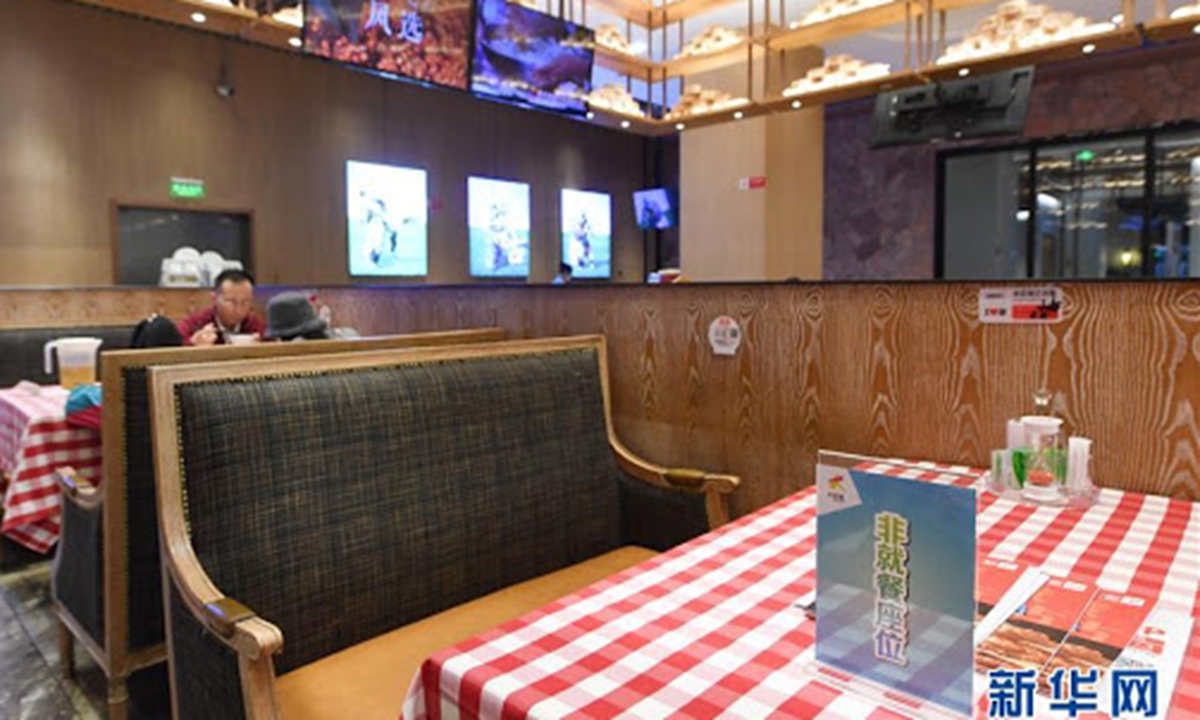Beijing restaurants brace for another hit from new COVID-19 cases
By Yang Kunyi and Song Lin Source:Global Times Published: 2020/6/13 18:16:34

File Photo: Xinhua
Restaurants in Beijing, especially Japanese restaurants are feared to take another hit from the latest wave of COVID-19 cases, despite having barely recovered from the previous lockdown, as health authorities upgraded the control level for the industry amid concerns over possible coronavirus resurgence.
The latest viral pathogens related to COVID-19 were detected on Friday on a chopping board used for imported salmon at Xinfadi market, one of the biggest vegetable and meat wholesale markets in Beijing. As of press time, 45 tested positive in throat swabs among 517 samples collected in the Xinfadi market.
The latest emergence of COVID-19 is weighing heavily on catering businesses, many of which have just started to see their restaurants recover from the two-month lockdown, which has paralyzed the industry.
However, Japanese restaurants seem to be taking an especially big hit, as salmon is commonly used and a widely popular dish in Japanese restaurants in Beijing.
An employee surnamed Tian at Woomy, a Japanese restaurant located in the Joy City shopping mall in Beijing, told the Global Times that customers have reduced by almost 90 percent since the news broke on Friday, and the restaurant has been receiving “non-stop” enquiries on its salmon from customers.
Beijing has temporarily upgraded its control level of the catering industry to level II, requiring customers to go through temperature checks and show health codes before entering any restaurant.
Group dining is forbidden, and customers have to socially distance by maintaining one meter when eating out, according to a statement issued by the Beijing Haidian Catering Service Trade Association on Friday.
“There’s a sudden sharp drop of customers in the mall and in our restaurant since yesterday, and we have taken all of our dishes that include salmon off our menu, as is required by the mall,” Tian said.
The new COVID-19 cases would cause a shock to consumers who have not completely recovered from previous lockdowns, and it is beyond doubt that the catering industry would take a second wave of hits, said Zhao Jingqiao, director of the Service Economy and Catering Industry Research Center under the Chinese Academy of Social Sciences.
For salmon and related industries, Zhao told the Global Times Saturday that as salmon is normally eaten raw and not an irreplaceable choice, consumers would incline to stay more cautious in the short term under informational asymmetry.
Tian is also worried that the shutting down of the major wholesales markets in Beijing will disrupt the supply of vegetables and meat in his restaurant, and is expecting price changes as soon as Sunday.
The catering industry suffered a 500 billion yuan ($70.6 billion) loss within the week of the Spring Festival from January 24 to 30, under the influence of the outbreak of COVID-19. Within the first two months of 2020, more than 130,000 catering companies cancelled their business registrations, according to a report by 36kr.com.
Six main markets which are a major source of fresh vegetable and meat supplies to restaurants in Beijing have been ordered to fully or partially suspend operations.
According to the Beijing Municipal Bureau of Commerce, Xinfadi market alone contributes to around 70 percent of vegetable supplies and around 10 percent of pork supplies in the city.
A staff member from Shunxinshimen Market, another of the six markets confirmed to the Global Times on Saturday, that the market is the supplier of food and vegetables to many supermarket chains, and it might affect fresh food supplies once the market is fully closed.
Major supermarket chains in Beijing, including Wumart, have immediately taken down salmon from their shelves after the detection of coronavirus at Xinfadi market.
Posted in: MARKETS,FOCUS